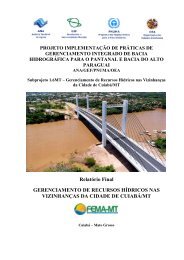- Page 1 and 2:
@) UtIITED NATIONS ENVIRONMENT PROG
- Page 3 and 4:
a' a @) UNITED NATIONS ENVI RONMENT
- Page 5 and 6:
L -iii- CONTENTS SOUTH PACIFIC REGI
- Page 7 and 8:
-I SOTJTH PACIFTC REGIO{
- Page 9 and 10:
TI-E SOUTH PACIFIC REGIOT.IAL ENVIR
- Page 11 and 12:
Immediate priorities -5 The Action
- Page 13 and 14:
DEVELOPMENT THEORIES IN THE PACIFIC
- Page 15 and 16:
-9 On the other hand, if any collec
- Page 17 and 18:
-tr Working through the list in rev
- Page 19 and 20:
-tl THE POTENTIAL Fm, MANAGEMENT ff
- Page 21 and 22:
-15 Islands, of course, vary in the
- Page 23 and 24:
-r7 REFERENCES Dq!!, A.L 1980. Regi
- Page 25 and 26:
?r) The si tuation is very differen
- Page 27 and 28:
-22 land for cultivation. Plantatio
- Page 29 and 30:
-24 Other examples of this form of
- Page 31 and 32:
_26 rrtnenagetnent') will become rx
- Page 33 and 34:
-29 PEFLE POTENTIALS IN TFE PACIFIC
- Page 35 and 36:
-tL TABLE 2 - Proiected inereara in
- Page 37 and 38:
-t3 Ssne of the Pacific countrieg r
- Page 39 and 40:
-t5 A rumber of features sppear to
- Page 41 and 42:
-t7 A PERSPECTIVE C.I I-T.JMAN I-EA
- Page 43 and 44:
-t9 The efforts commenced throughou
- Page 45 and 46:
-4r of real improvements must be pa
- Page 47 and 48:
mmhg t70 rco r50 t20 I roo -4t Figu
- Page 49 and 50:
-45 The changes described above can
- Page 51 and 52:
ot - E E 60 -47 Figure 4 Age 0 15 2
- Page 53 and 54:
Diabetes -49 Diabetes is a common c
- Page 55 and 56:
-51 Table 4 : Age-Standardized Prev
- Page 57 and 58:
-5t REFERENCES Finau, 9. A. S 4. l?
- Page 59 and 60:
AN]€X I -55 DECLARATION tr ALMA A
- Page 61 and 62:
c o EN Jl' (U o, ,o -ts m = o, -r,
- Page 63 and 64:
SL o 'or =o 60 sub s tr uc tur e |
- Page 65 and 66:
-62 Figure ) : Coral atoll (hslf wi
- Page 67 and 68:
Rain Wetar -g Srnplescollectedfromr
- Page 69 and 70:
pH 7.5 7.' Ca Wall Management t07 l
- Page 71 and 72:
u Introduction -69 POLLUTION PROBLE
- Page 73 and 74:
4. 5. 7I Persirtence and Movement i
- Page 75 and 76:
-13 In Kiribati, however, me exarnp
- Page 77 and 78:
-75 FISIfRY POTENTIALS IN TI.IE TRO
- Page 79 and 80:
-77 transition into depths exceedin
- Page 81 and 82:
lrJ Ez =g P3 qB f,tl s9 LU t.
- Page 83 and 84:
-8I in longline fishing effort woul
- Page 85 and 86:
-81 REFERENCES ANONyMOUS. 1975. Rep
- Page 87 and 88:
-85 Tl-E cHALLEl.lcE ff coNsERvIlG
- Page 89 and 90:
-87 e$enlial to these peoples' surv
- Page 91 and 92:
-90 at,olls in bhe tropieal South P
- Page 93 and 94:
-92 Biogeographic provinces in the
- Page 95 and 96:
_94 Variability in the physical, ch
- Page 97 and 98:
-96 Salvat (1980), m the other hand
- Page 99 and 100:
-98 Table I : Intentional rnarine c
- Page 101 and 102:
Irprcvcd hervcrtlng tcctnologicr -
- Page 103 and 104:
- r02 REFERENCES Alcala, A.C. 1976.
- Page 105 and 106:
- 104 Ladd, FlS. 1971. Bikini and E
- Page 107 and 108:
- 106 Salvat, B. 1980. The living r
- Page 109 and 110:
lndustrial Wood Demand and Supply -
- Page 111 and 112:
-IIO- the survivel of agriculiure.
- Page 113 and 114:
-LIz- adaptability. If that capacit
- Page 115 and 116:
Il5 TR@ICAL FORESTRY IN MELANESIA A
- Page 117 and 118:
Natural forest cover - r17 Even now
- Page 119 and 120:
- 119 Ecologists and silvicultureli
- Page 121 and 122:
2t Betrind the low-lying raised cor
- Page 123 and 124:
- rzt combination of metalled loggi
- Page 125 and 126:
125 - The vegetation rnatrix is not
- Page 127 and 128:
Ppua Ncw Guinca (Enga) Constrtlctio
- Page 129 and 130:
- L29 MIi.IERAL POTENTIAL tr THE SO
- Page 131 and 132:
Figure): Diagramsof Massive sulphid
- Page 133 and 134:
- Ltt Table 2 : Mineral Resources o
- Page 135 and 136:
Nauru - tt5 The third mejor mineral
- Page 137 and 138:
- Lr7 magnetic fields - a chanacter
- Page 139 and 140:
- 119 Davies' l'l L 1981. Eveluatio
- Page 141 and 142:
- l4l Whalen, J.8., R. M. Britten a
- Page 143 and 144:
- L4t ENERGY POTENTIALS tr PACIFIC
- Page 145 and 146:
t45 Table 2 : Economics (f979-80) C
- Page 147 and 148:
- I47 Realizing this, trre of the s
- Page 149 and 150:
I - 149 REFERENCES Lbyd' C. R. 198r
- Page 151 and 152:
- L52 The report of lhe Technical G
- Page 153 and 154:
- r54 Exposures to ionizing radiati
- Page 155 and 156:
- 156 REFERENCES Fieldes' M.' G. Be
- Page 157 and 158:
- r58 "The ielands are concerned no
- Page 159 and 160:
- 160 Further, in keeping with the
- Page 161 and 162:
Forum Firheriar AgancY - L62 The Cm
- Page 163 and 164:
- L65 OVERVTEW tr TI-E EAST ASIAN S
- Page 165 and 166:
Environmental Aesesgment Component
- Page 167 and 168:
- L69 INSTTTUTIO{AL AtO FtNAfiCIAL
- Page 169 and 170:
- l7t PROBLEMS INVOLVED TN TI-E IMP
- Page 171 and 172:
- 17, OCEANMRAPHTC ASSESSMENT tr TI
- Page 173 and 174:
- 175 of the region is the feason w
- Page 175 and 176:
- rl7 Tl'n Kuroshio begins east of
- Page 177 and 178:
Ternperetur€ - 179 One of the fea
- Page 179 and 180:
Figure 7 : Average sunface loot too
- Page 181 and 182:
- l8] content fnom South-Easl Asian
- Page 183 and 184: - 185 CffiAL REEF DEGRADATION AIS P
- Page 185 and 186: Hg+* WAIER coRAL Teluk Tel* Solong
- Page 187 and 188: I HARIMAU PULAJ BABI HUJONG - t89 ?
- Page 189 and 190: BRANCHED CORAL - 19I TAB.JLATE @RAL
- Page 191 and 192: - Lgt Coral reefs along the coest o
- Page 193 and 194: Lcation LUZ0{ l. Albay 2. Bataan I.
- Page 195 and 196: - r97 the variations in fish abunda
- Page 197 and 198: - r99 A growing eause f or concern
- Page 199 and 200: - 20I of the coral lrade in the bro
- Page 201 and 202: - 20t In Thailand, there is one rep
- Page 203 and 204: - 205 Gomez, E.D. 1977. Species div
- Page 205 and 206: - 207 Valencia, lrt J. I98Ib. South
- Page 207 and 208: - 210 In recenl years' there has be
- Page 209 and 210: - 2r2 air and water quality monitor
- Page 211 and 212: - 2L4 Tle usefulness of zoning is s
- Page 213 and 214: - 216 (h) formulating laws and regu
- Page 215 and 216: - 218 ln Malayeia and Brunei, the N
- Page 217 and 218: Oil activities - ?20 Table I : Hydr
- Page 219 and 220: Neme of vessel or incident Tolo Sea
- Page 221 and 222: - 224 Oil released during deballast
- Page 223 and 224: - 226 ln the South China Saa active
- Page 225 and 226: - 228 o oo IF th (o E t,o PA lo. !,
- Page 227 and 228: - zto The following nrethods were u
- Page 229 and 230: - 2t? REFERENCES Anonymous. 1980. S
- Page 231 and 232: - 2r4 Annex I : Map of placee npnti
- Page 233: - 256 The biggest problem associale
- Page 237 and 238: - 240 Oftenr a direct comparison is
- Page 239 and 240: For seawater (PPm) Cd Co Cr Cu 0-0.
- Page 241 and 242: Sea water - 244 The sea water in th
- Page 243 and 244: - 246 organisms reiect the metal pa
- Page 245 and 246: - 248 Rahaman, A., C.L. Sien, and D
- Page 247 and 248: - 250 In addition, mining degrades
- Page 249 and 250: Marine fauna and flora - 252 Beside
- Page 251 and 252: - 254 REFERENCES Bak' R.P. 1978. Le
- Page 253 and 254: Backqround - 257 ACTIO{ PLAN FOR TI
- Page 255 and 256: - 259 Tte Envirannrantal Areasmcnt
- Page 257 and 258: Introduction - 26r MARIT.IE POLLUTI
- Page 259 and 260: CANAL DE FArrAMil A\ ) PANAMA BAHIA
- Page 261 and 262: Kind - 265 Tabb 2 : Industries disc
- Page 263 and 264: - 267 Studies dme between 1974 end
- Page 265 and 266: - 269 Guillen end Aquino (f978) and
- Page 267 and 268: Other areas with important pollutio
- Page 269 and 270: - 27t OIL POLLUTIOII IN TFE SOUTH{A
- Page 271 and 272: Oil traneport in the region - 275 A
- Page 273 and 274: - 277 Co-operstion protocols in the
- Page 275 and 276: '279a GEAN CIRCUI.ATIOII IN TI.E EA
- Page 277 and 278: Weetern Pacific (Coast of Irdonesia
- Page 279 and 280: - 28t Obgervation of winds the key
- Page 281 and 282: - 285 INTER.REGIOT.IAL CO.FER ATIOT
- Page 283 and 284: (2S11 PUBLICATIONS IN THE UNEP REGI
- Page 285 and 286:
TZUJJ No. 40 SpC/SPEC/ESCAP/UUEP: R
- Page 287:
tZ^A\ \IIl Issued and printed by: P



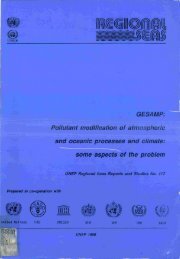
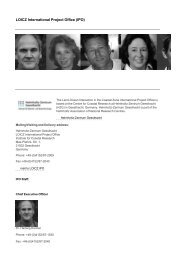
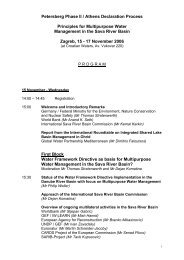
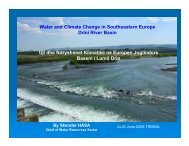
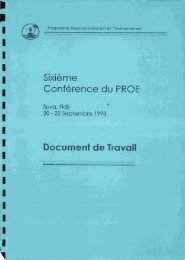


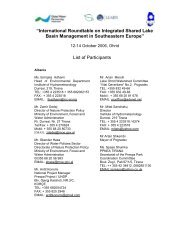

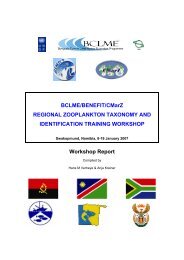
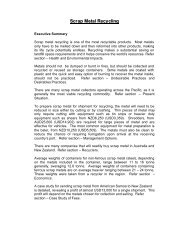
![R]€@lll](https://img.yumpu.com/7594335/1/175x260/reurlll.jpg?quality=85)
